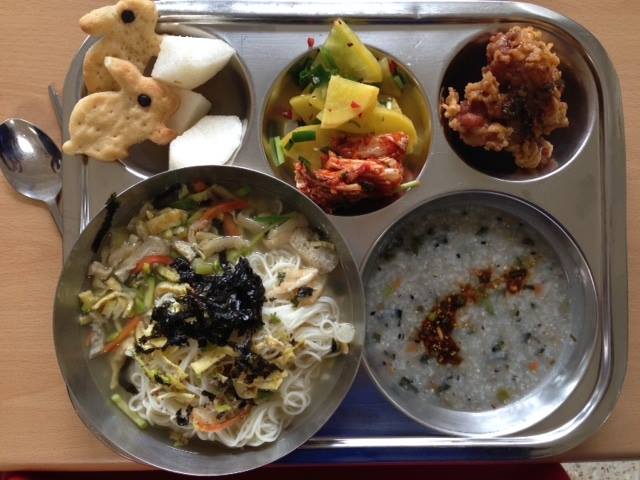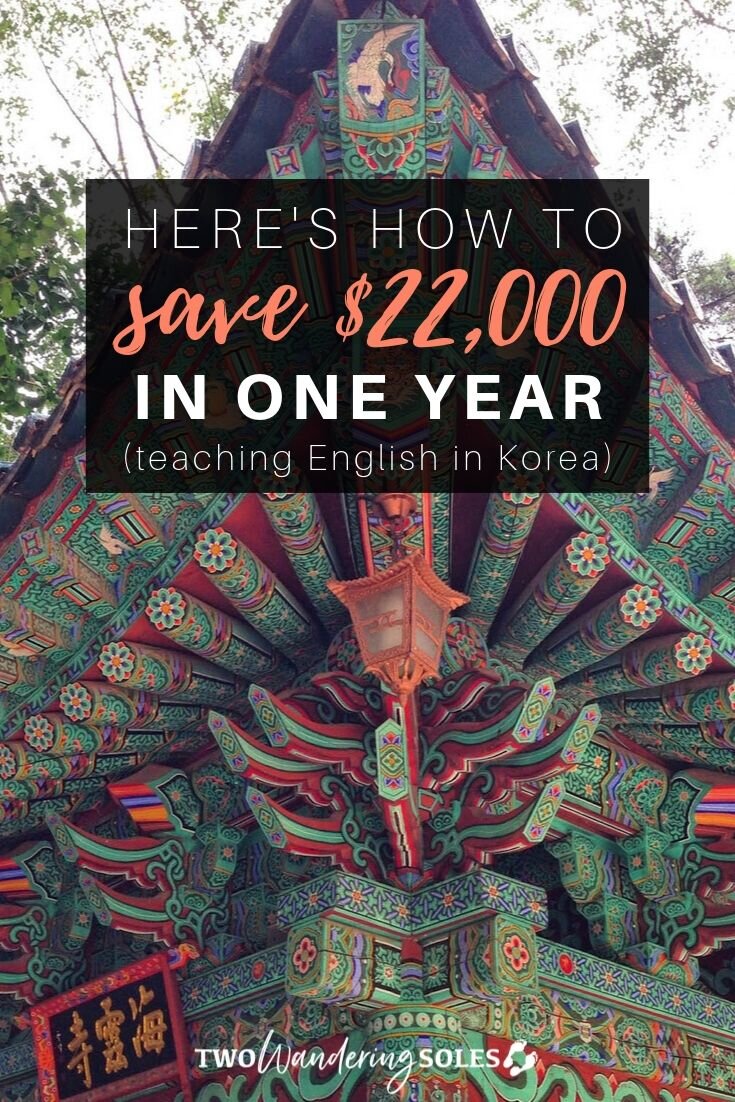
Yes, you read that number right. And yes, that is how much we saved PER PERSON. I’ll spell it out one more time to avoid any confusion. We saved $22,000 US dollars EACH during one year of teaching in Korea… Just over $44,000 between the two of us. And we could have saved more if we traveled less and didn’t eat so much. But hey, no regrets here!
If you’re considering teaching English in Korea, you already know the money is good. The promise of a free plane ticket and rent-free apartment are benefits enough to move across the world. Add to that a decent salary and a relatively low cost of living, and you have a surefire way to save a ton of money, right? Wrong.
If you come to Korea expecting to double your bank account but have no real budgeting plan, you won’t save any money. We watched many people arrive in Korea with dollar signs in their eyes, but halfway through the year they looked at their bank account only to realize they had saved hardly any money.
But we’ve also had friends completely pay off their debt, or save up enough money to travel long-term. And we are pretty proud of the little “nest” we built in just one year that’s allowing us to travel the world and pay off student loans.

PLEASE READ: We are not sharing this information to be boastful, but instead to answer the many questions we have received about how we afford to travel. Additionally, we hope this information is helpful to others who choose to be a teacher in a Korean classroom with the goal of earning money along the way. We believe that with discipline, anyone can reach their saving goals.
So how did we do it? How can you save $22,000 teaching in Korea too? Keep reading for a breakdown of just how much life in Korea will cost you, and how much you should expect to save. Then read on for some exclusive tips that helped us save money in South Korea, and we’ll even reward you with a FREE DOWNLOAD of the exact same spreadsheet that helped us stick to our budget.
Are you ready? Okay, here we go…
How much will you earn teaching English in Korea?
We’ve had countless emails and Facebook messages from old friends and new readers all wondering the same thing… How can we afford to travel? We have lots of tips we’ll be sharing soon, but one of the biggest ways we were able to save money was by teaching in South Korea. So how much, exactly, did we earn? And how much were we able to save?
Drumroll, please… Here come the numbers everyone is excited about. We have them all broken them down for you.
(Please note: All figures are for ONE PERSON during ONE YEAR as an EPIK English teacher.)
Salary: 2,400,000 won per month ($2,143 USD*)
Your English teacher salary, as with many things in Korea, depends on many things. EPIK salaries start at 2,000,000 won per month, but many English teachers take home more. Your salary can be influenced by factors such as: previous teaching experience, level of degree in university, number of schools you teach at and location of your placement.
Furthermore, teachers will receive a raise in salary for each year they renew their contract. So if you plan to stay in Korea a while, you can really roll in the dough!
I had two years of previous teaching experience, and Ben taught at more than one school plus he has his Master’s degree, so each of us earned more than the starting salary.
*The salary listed above is the average of both Ben’s and my salaries. Depending on your qualifications, your salary may be slightly higher or lower.
Further breakdown:
Previous Teaching Experience: If you have 2 or more years teaching experience, your starting salary will be 2,500,000 won per month. Note that you will need written proof, and your experience will need to meet certain requirements.
Multiple Schools: Most of the EPIK English teachers we know taught at more than one school. While this may seem overwhelming at first, it is actually a good thing! That’s right, you’ll earn an additional 100,000 won (about $89 USD*) per month. And if you are at more than 2 schools, you’ll rack up 150,000 won each month.
Rural Placement: If you are placed in a rural region, you will receive a stipend of 100,000 won per month. This is often necessary, as travel from the more remote towns can add up.

Update: Teaching during the day is not the only thing you can do to make money. One super easy way Ben has recently found is to teach English in an online classroom with VIPKID.
You can earn anywhere between $16-$22 per hour (plus additional incentives) practicing English elementary-age students in China. You can set your own schedule (best hours are Beijing evening time), work as many hours as you want and you don’t even need to your TEFL to do it.
All you really have to do is be on time, be energetic and be happy, which many of you already are. Check out it VIPKID here, it will be the easiest money you make online.
Entry Allowance: 1-time payment of 300,000 won ($268 USD*)
This is kind of a “get you started” bonus that you’ll receive as soon as you get to your city.
Tip: It might be tempting to spend it all at once furnishing your apartment with cute coffee mugs and throw pillows, but try to only get the essentials – a few pots and pans, toilet paper, and all that fun stuff – and pocket the rest. If you’re lucky, the previous teacher will have left some items behind, so take advantage of that.
Take a look at our South Korea packing list so that you are prepared when you arrive and don’t have to purchase too much to get on your feet.
Flight Allowance To and From Korea: Two 1-time payments of 1,300,000 won = 2,600,000 won total ($2,321 USD*)
Your school pays for your way to and from Korea. Your entry flight allowance will be paid to you in your first month’s pay, and your exit flight allowance will be given to you on your last month’s pay.
Tip: Stalk your flights and get the cheapest one possible. Your school will give you the same amount regardless of how much you pay for your flight. For example, our return flights to the US were just $430 (we booked our August flights in January), but we still received nearly $1,160 USD from our schools.
Severance: 1-time payment of 2,400,000 won or equivalent of 1-month’s salary ($2,143 USD*)
If you successfully complete your 1-year contract, you will be given an additional month’s salary. So it’s like 13 months of pay for 12 months of work. Wahoo!
Pension: 1-time payment of 2,600,000 won ($2,321 USD*)
A portion of your monthly salary is deposited into the Korean National Pension system, and the government will match what you put in. You’ll receive this money about one month after you complete your contract.
Note: Unfortunately, South African citizens are not eligible for this payment as this time.
Extra Income
There are chances for you to earn extra income during the year if you choose. We only took advantage of a couple such opportunities, but certainly could have found more.
Note: The following payments are for one person.
Weekend English Camps: 1-time payment of 800,000 won ($714 USD*)
Every year there are opportunities to do weekend, winter, or summer English camps. Ask your school or get in contact with you regional EPIK coordinator and request to be considered these extra money-making gigs.

EPIK Life Video Contest Winner: 1-time payment of 500,000 won ($446 USD*)
Each year, EPIK holds a competition for videos that showcase what life is like teaching in Korea. I submitted my video, and guess what?! I was selected as the grand prize winner! The reward? A cool 500,000 won. Try out your video editing skills, even if you are a novice like me… you might just surprise yourself! And keep a lookout for other contests hosted by EPIK throughout the year.
Total Income: 38,000,000 won ($33,929 USD*)
This number is the total earnings of our English teacher salary, entry allowance, flight allowances, severance and pension, as well as some additional money we earned.
*All conversions use the average rate of 1,120 won = $1 USD (throughout August 2014 to August 2015)

FREE E-BOOK ON WHAT IT’S REALLY LIKE TEACHING ENGLISH
If you’re considering teaching overseas, you MUST read this. Most bloggers and TEFL providers don’t like talk about these 13 things, because they’re not fun to hear.
But taking the leap to teach abroad is a big, life-altering decision, and we think it’s important to know exactly what you’re getting into. The good, the bad, the UGLY. All of it.
How much will life in Korea cost?
Okay, now that you know how much each of us earned over the course of the year, let’s talk expenses. How much did we spend exactly? Well lucky for you, we kept track of every single won!
(All expenses below are monthly averages for ONE PERSON)
Housing: 0 won per month ($0 USD*)
One of the biggest perks about teaching in Korea is that your school will pay your housing cost! See what a typical home looks like in a video tour of our Korean apartment.
Internet: 0 won per month ($0 USD*)
Internet is also typically provided by your school.
Bills: Electric, Gas, Phone, and School Lunches – 143,000 won per month ($128 USD*)
Electric and gas: This cost will vary per month depending on how you use A/C, ondol floor heating (which we barely touched because it took 4 hours to heat our apartment), and your stove.
We generally paid more in the hot summer months because we used our air conditioning. Gas and electric fluxuated from 20,000 won to 80,000 won, but the average was about 40,000 won per month ($36 USD*).
Phone: We both had phone plans through Olleh that each cost 38,000 won per month ($34 USD*).
Tip #1: We rarely used minutes on our phone, and would have preferred to have a cheaper plan that had fewer minutes. We learned that once you sign a contract it is very difficult to change until the contract’s end date.
Tip #2: DO NOT sign up for a phone contract through The Arrival Store. Their plans are much more expensive than you will find elsewhere. Our advice is to wait until you move to your assigned city and go with your co-teacher to find a plan that works for you. And yes, you will be just fine without data during orientation!
Lunch: You will pay for lunches at school that you eat right alongside your students and co-teachers. Each school charges a different price and there’s not any negotiation. Unless you are a vegetarian, we highly recommend eating your school’s lunch. It can be seen as disrespectful if you opt out. Plus, it’s much simpler than preparing your own lunch every day and is a way to try different Korean foods.
The cost varied depending on the number of school days in the month, but the average cost was about 65,000 won per month ($58 USD*).

Food: 175,000 won per month ($156 USD*)
We cooked many of our own meals at home and sometimes went out to eat with friends.
Tip: To save money and time, we typically bought produce at a local supermarket and cooked one big meal on Sunday night. It usually lasted until the weekend when we often times ate out with friends.
Transportation: 40,000 won per month ($36 USD*)
Korea is fairly cheap to travel around. This category includes local bus and metro fees, taxis, and short trips to neighboring cities.
Tip: Avoid taxis as much as possible, and get to know your town’s bus route instead. Many cities in Korea have a phone app with a map and timetables. The city bus may take a bit longer, but is far less expensive.
Entertainment: 95,000 won per month ($85 USD*)
Living in Korea is tons of fun! We bundled entrance fees, movie tickets, fancy dinners, coffee dates, bingsu cravings, karaoke, nights out at bars, and any alcohol purchases into our entertainments expenses.
Tip: Tons of coffee shops line just about every street in Korea, and it’s tempting to go several times a week. Try to limit yourself or brew your coffee at home, because a cup o’ joe is not cheap in this country.
Travel within Korea: 170,000 won per month ($152 USD*)
We traveled a ton. We actually went through our calendar as found that we traveled 67% of the weekends we lived in Korea. That’s 35 weekends! (Yeah, Ben is an Excel nerd!) From bare-hand fishing in Pyeong Chang, exploring sunny Busan, nights out in Seoul, and reveling in the island beauty of Jeju, we saw a lot of the country.

Travel Outside of Korea: total of 3,472,000 won ($3,100 USD*)
While living in Korea, we visited 3 other countries. We traveled on a budget, though we had some vacation splurges here and there. You can check out the detailed budget breakdowns for each of our trips to the Philippines, Japan, and Indonesia.
Note: International flights to these destinations are included in this category and totaled $1,094 USD.
Miscellaneous: 50,000 won per month ($45 USD*)
There will always be those expenses that you just can’t plan for, such as random school activity fees or a co-worker’s wedding gift. We also had some purchases that don’t fit into any other category like clothes, home supplies and presents.
Flights to and from Korea: 1-time payment of 1,545,600 won ($1380 USD*)
Our flights TO Korea (in August) were $950 USD, and our flights BACK HOME to the US (in August) were $430 USD.
Note: If you are going through EPIK, you likely won’t have much time to research flights before purchasing, and like us, you’ll end up paying a little more than you should. The $1,300 flight allowance is generous though, and hopefully your ticket will be less than that.
For your return flight, start researching 10 months before you plan on leaving for the best deals. In January, we found a flight from Seoul to Minneapolis for $430 total which we just couldn’t pass up!
Student Loans: $0…sorta…
What about student loans? Maybe you’re lucky and don’t have any debt from attending university (in which case, I’m super jealous!). But if you’re like us, and have lots of student loans to pay, don’t forget to include your monthly payment in your budget.
We worked really hard to save enough money at our jobs back at home to cover our loan payments for the entire year. That is why our loan payments are not included in this calculation.
Total Expenses for the Year: 13,093,600 won ($11,691 USD*)
This number includes monthly bills, food, transportation, entertainment, travel within Korea, travel outside of Korea, miscellaneous cost and flights to and from Korea.
Bottom Line:
Total Profit for the Year (38,000,000 won) minus Total Expenses (13,093,600 won) = 24,906,400 won… that’s equivalent to roughly $22,238 USD PER PERSON!!!
*All conversions use the average rate of 1,120 won = $1 USD (throughout August 2014 to August 2015)
READ MORE: Now that you have all the numbers, continue reading for some exclusive tips and tricks that helped us save $22,000 in one year!
We will even reward you with a FREE DOWNLOAD of the exact same budget spreadsheet we used to keep track of our budget! All you have to do is sign up with your email and we will personally send you our budget spreadsheet.
Are you interested in teaching English abroad
Teaching English in South Korea was one of the best decisions we’ve ever made. Be sure to check out our Teaching English Abroad homepage for resources on everything you need to know from how to get started to moving abroad. Or you can read some of our favorite articles about teaching English below.
- TEFL Certification: The Complete Guide to Teaching English Abroad
- How to Save $22,000 in One Year Teaching English in South Korea
- Things I Wish I Would Have Known About Teaching English With EPIK
- 11 Reasons Why You Should Teach English Abroad
If you’re planning a trip to South Korea, be sure to check out our Ultimate Guide to South Korea for answers to all of your most burning questions!
Save this article on Pinterest for later!


We want to hear from you!
Do you have any more questions about how much you can save, or budgeting while teaching English in South Korea? Leave you comment below and we’ll do our best to get back to you!

Hi there!
I’m currently teaching in South Korea to pay off my loans. I plan to be here for the next 4 years or so. I’ll be saving monthly and will also have a significant amount of pension to collect. My question is how did you send your money home without losing a chunk of it to the bank??
Hey Katie!
Loved your post! Thanks for all the info. I was wondering, how exactly do you apply as a couple? Will you be placed at the same school? How does it work for accommodation?
Many thanks in advance!
Hi Gill, on your EPIK application you mention you are a couple (or married couple) and request to be placed near each other. If you are married, you will have the same accommodation in the same city but work at different schools. If you are just dating, then you have to request to be in the same city but you are not guaranteed. And you will not have the same accommodation. Hope this helps.
Hey there!
Loved the post! I am beginning the EPIK program next month and had a quick question. I am currently teaching on iTalki and noticed you mentioned teaching online. I know technically this in violation of the E2 visa.. did either of you teach online while working for EPIK? What was your experience with this?
Thanks in advance!
Hey Claire, congrats on starting EPIK soon 🙂 We did not teach online while living in Korea. Ben started about 2 years after we left actually. Sorry I can’t give you any more info on that. When we were there, teaching online wasn’t nearly as popular as it is now so I don’t know anyone who has experience with this. Best of luck and enjoy every minute of your time!
Hi Katie,
Thanks for this write-up – I am interested in teaching English in South Korea so this is really helpful.
The only problem is that I don’t have US/UK/Ireland/NZ/Aus nationality. Does this mean there’s no way for me to teach English in South Korea? (I was also interested in teaching in Japan but it seems they have the same requirements). I speak French fluently but I don’t think that helps in any way?
One indirect path I have been thinking about is that my partner of 6 years is Irish (we live in Ireland together, English is now my first language, etc.) and we are planning on getting married in a few years – at which point I could get Irish nationality I think. Would that work? Kind of a longer-term plan but we’re not in a rush, we just want to get the chance to live abroad "for real" (within-Europe moves don’t really count to us)!
Thanks in advance for your help and please keep writing, I really enjoy your blog 🙂
Lucie
Hey Lucie, that’s a tricky question. EPIK typically only take teachers from English speaking countries, but if you could prove that you are an Irish resident/citizen then that might work. The best people to contact about this are the EPIK team, they would have an answer. Hope this helps!
Thanks very much for your reply Katie – will do!
Best of luck on your travels 🙂
Lucie
very useful writeup! you mentioned about ben working with Vipkid.. i had heard that you arent allowed to pursue any other work outside of public school job .. is that not true?
Hey great question. That’s correct (or at least it was when we were in Korea). We didn’t do work outside our school, but I imagine some people do (actually I know some people do different types of work online while teaching).
Ben started VIPKID after we left Korea.
Hope that clears it up a bit!
Suuper interested in doing something like this! The one issue is that my girlfriend is not a native English speaker so she’s not confident in her ability to teach it. She would probably do some other freelance work instead, so I’m wondering if it would still be possible for her to live with me in the provided accommodation. Obviously, we’d have to pay for her flights and such, but I’d like to know what this all looks like if only half of a couple is actually teaching. Any thoughts?
Hi Alex, glad to hear you’re interested in teaching English in Korea. For your situation, the issue I see is your girlfriend would need a visa that allows her to stay in Korea for the same amount of time as you. If you sign up for EPIK, you will have a year long work visa but she will not. For Americans, the tourist visa is only for 3 months. At the end of the 3 months you have to leave the country. So she would only be able stay for 3 months.
If you are able to get around the visa situation, I believe EPIK (or your school) doesn’t “technically” allow you to have guest stay in your apartment. So If they find out you have your girlfriend livings in your apartment, you might get in trouble. That being said, we stayed the night many times at our friends apartments.
Where is your girlfriend from? Because if she is from one of the countries on the EPIK list, she could teach. It honestly is one of the easiest (and best paying jobs) we have ever had. I had not teaching experience before I received my TEFL cert and I easily transitioned to be a teacher. I hope this helps. Let me know if you have any more questions.
Thank you for writing this informative article, Katie and Ben! I just had one question if you could help me out. How early in August can you leave Korea having completed your 1 year contract? I’m thinking about putting off law school for one year to do this and orientations are usually around 16-21 August timeframe. Thanks again!
I don’t why my name posted like that! My apologies. It’s Joe!
Hey Joe, it all depends on your school, but August 16th might be a little early to leave your contact. For example our contacts ended on August 25 and our schools made us go to work until the 25th, even though is was summer break. But we had other friend’s schools that were much more flexible with days off and vacation. So unfortunately it all depends on your school. If you do decide to go with EPIK, I would recommend to talk to your school early and often so they know that this is a big thing you have to get back home for. Hope this helps.
Hello!
You mentioned that you can gain a higher salary for teaching if you have already taught for 2 years. However, you said that this teaching experience has to match certain requirements. What kind of experience are they looking for? Would a learning center versus teaching a school match?
Also would only certain schools pay you higher and you have to search for them? Because i’d imagine most public schools would rather pay a slightly smaller salary to people who have their TEFL and no experience? Thanks for any advice! I’m hoping to teach in Portugal for one year, then move to Korea. But if waiting a second year really does help with salary then I might do that.
Thanks!
Mary
Hey Mary. Here is the EPIK webiste breakdown for pay level requirements.
http://www.epik.go.kr/contents.do?contentsNo=49&menuNo=278
It doesn’t matter where you teach, it is all run by the same system, so the pay is all the same. I hope this helps, let us know if you have any other questions. Cheers!
We taught with EPIK, too! Actually, that’s where my boyfriend and I met. We saved a lot and that has allowed us to travel for two years post-contract. Such a sweet gig! We have wonderful memories in Korea. I taught in Japan and Australia after that, which were totally different experiences.
Hey Lianne! EPIK is great! We loved our time in South Korea. So sweet you met your boyfriend there. How was teaching in Japan? We have heard mixed reviews, and we are curious what you thought.
Hello! I want to start out with a big thank you for the time and effort you have put in to informing others of how to be financially responsible while still seeing the world and creating new experiences. Firstly, all your blog posts have been extremely beneficial in helping me mentally prepare and motivate myself to do the things necessary to be able to work and teach in Korea. I have not completed my degree; which I know is a mandatory element to following the same path you took, but your information has helped in planning for the future. I now have a better understanding of what is possible, how it can be more affordable and some key points to consider when I finally complete my degree and consider EPIK. Although your blog is quite long, I found all the information interesting, helpful and exciting. The links you embedded throughout to give more context and provide tools were smart and added to the content in a big way. The breakdown of your budgets, added anecdotes about your adventures and pictures to support your story made reading this fun. Hopefully one day I will be able to write something similar after I make my dreams a reality. Thanks for sharing!
Hi Christy, Thank you so much for the kind words about our blog. This made our day! We’re glad our articles have been helpful to you and your future plans. We hope you reach out to us if you have any questions about teaching abroad or traveling overseas! Hoping you have a great start of the New Year!
Hello,
Thanks for all the helpful information! What TEFL course did you take? Did you take an online course or in-person course? I’m doing some research and sounds like in-person courses are best, but found some great (and cheap on Groupon!) online courses that would give me the same TEFL certificate. Not sure if there is a difference between them?
Thanks!
Hi Veronica. We took our TEFL course online because we were both working full time while taking the course. The difference between in-person and online courses are really personal preference.
If you are thinking about teaching in Korea, there some cities/areas that required you to have completed a TEFL course in-person (I think Busan is one of them), but other than that they are fairly equal. The Groupon deals are hard to pass! You will want to look at the program you are thinking of applying to and seeing what their requirements are for a TEFL course. You will also want to make sure your TEFL course is accredited and legitimate. Look at reviews and testimonials before purchasing. Happy Teaching!
Hello! This post, along with all of your others about South Korea have been extremely helpful for me. I’m gearing up to leave in early 2018 and am also determined to save some money while I’m over there. I signed up for your mailing list but have not yet received the excel spreadsheet for budgeting. Are you still able to send those out? I would greatly appreciate it!
Your experiences have been delightful to read about and are helping me to prepare for my upcoming adventure. Thank you!
Hey Alexa, we’re glad to hear that our articles have been helpful. I looked back at our records and we sent you the spreadsheet on Nov 22nd at 10:58am. The title of the email is "Here’s Your Budget Spreadsheet". If it not in your inbox then please check your spam folder. If you still can’t find it, let us know, and I’ll personally send it to you. We’re excited for your next adventure! Cheers!
Thank you for your detailed post! I am looking in to teaching abroad but want to pay on my student loans while doing so, I think South Korea might be my best bet. You mentioned that you had 2 years of teaching experience – are you a credentialed teacher? Did you get your TESOL/TEFL cert as well? I am credentialed in CA with 2 years of experience teach ESL to students here and wondering if the extra certification is really necessary.
Hi Alicia, We did get our TEFL certification before we applied to EPIK. They don’t required it, but if you don’t have a TEFL then your chances of getting accepted are very slim. And you get paid more if you have the TEFL (plus you will get even more money because you have teaching experience). If you really don’t want to do the TEFL course for the cert, maybe you can try reaching out to Hogwans (private schools) because some may take you without it, but I have no experience with this. The TEFL course is really simple and you can get it done pretty quickly. I would highly recommend it if you are considering teaching in Korea.
Thank you – I’ll look in to it more. I was really only trying to avoid it because of the cost but it sounds like it will be worth it.
I think it would be worthwhile and it would pay for itself and then some! One of our friends bought a TEFL course on Groupon for $69 and it worked the same as ours (and we paid much more!) haha might be worth checking out if there are some on groupon still. I would honestly do the cheapest course you can find, since you have teaching experience and you are doing it more for the cert than the experience. From what we know, they accept pretty much all TEFL courses – no preference to the expensive ones. Best of luck!
There are a few on Groupon – thanks for the tip! I wouldn’t have thought to check there myself